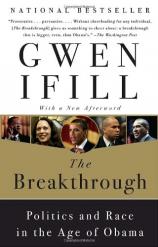The Breakthrough: Politics and Race in the Age Of Obama
Review
The Breakthrough: Politics and Race in the Age Of Obama
The Obama presidency --- less than a month old as this is
written --- is already generating a tsunami of commentary,
appraisal, praise, criticism, advice, warning and general
can-we-really-believe-this wonderment.
The voices producing all this punditry come overwhelmingly from
white observers. In this wide-ranging book, TV journalist Gwen
Ifill (remember her as moderator of the 2008 vice presidential
debate?) gives us a much-needed perspective from the black
community itself.
Some of her conclusions may surprise you. There are, for
example, sharp generational divisions within the black community
over what the election meant and what it may mean for our political
future. Race still looms as a major issue in American politics. A
huge step forward has indeed been taken, but where the path leads
and who will blaze it are unanswered questions.
The major theme of Ifill’s book is the deep psychological
and tactical division between the older generation of black civil
rights activists --- those who endured the fire hoses, the attack
dogs, the beatings --- and the newer crop of young black political
hopefuls who want to build in their own way on what their elders
accomplished. The younger group reveres and respects what the
pioneers did, but their own objectives are quite different. The
situation is nicely summed up by a quote from Michael Steele, the
Maryland politician just elected chairman of the Republican
National Committee: “This generation is less interested in
having a seat at the lunch counter and more interested in owning
the diner.”
This amounts, in Ifill’s phrase, to a
“redefinition” of black politics and politicians. In
his campaign Barack Obama tried to straddle the divide by
soft-pedaling the idea of past black militancy and struggle,
speaking instead of the need for blacks and whites to seek common
ground for the general good. It was a kind of unconscious echo of
Thomas Jefferson’s “We are all Republicans; we are all
Federalists.”
Obama’s election certainly marked a milestone in the long
road toward racial tolerance in America, but most of the
politicians Ifill consulted have no rosy illusions that we have
entered a “post-racial” political era, and Ifill seems
to agree with them. She repeatedly invokes the image of sandpaper
to characterize the uneasy state of friction that still exists
below the political surface.
The younger generation of rising black politicians is still
irritated by the idea that they should “wait their
turn” instead of pushing aggressively toward their political
goals. In this regard, Ifill focuses on three highly visible black
activists: Newark Mayor Corey Booker, Massachusetts Governor Deval
Patrick and Alabama Congressman Artur Davis. While admiring the
political skills of Booker and Patrick, she is somewhat critical of
both men for ignoring sound advice and trying to accomplish all
their goals in too short a time. She sees Davis as obviously
planning a run for governor of Alabama, a risky move to put it
mildly.
Within the black community, Ifill finds an undercurrent of
unease with politicians perceived as not “black
enough.” When the young Deval Patrick came home to Illinois
on a break from Milton Academy in Massachusetts, his sister taunted
him with “you talk like a white boy!” And there were
those who wondered why Barack Obama did not say more about
specifically black concerns during his campaign. (Of course, on the
other side stood those whites who rejected any black candidate
simply because his skin was black and dismissed Obama as a secret
Muslim or even the Antichrist. Ifill pays them little heed other
than to implicitly acknowledge that they are indeed still with
us.)
The last section of Ifill’s book is a survey of promising
second-level black politicians from around the country --- state
legislators, mayors, government officials. These are the people,
she says, who may make up the next wave of nationally prominent
black political figures. This final chapter reads a little like a
baseball scouting report from the minor leagues, listing the
hottest young prospects for future seasons.
THE BREAKTHROUGH is well written, but it is perhaps most
valuable for the questions it raises than for any answers Ifill
provides. These answers we must all figure out for ourselves. If we
blithely ignore the questions, there still could be troubled days
ahead.
Reviewed by Robert Finn (Robertfinn@aol.com) on December 23, 2010
The Breakthrough: Politics and Race in the Age Of Obama
- Publication Date: October 27, 2009
- Genres: Current Affairs, Nonfiction
- Paperback: 320 pages
- Publisher: Anchor
- ISBN-10: 0767928903
- ISBN-13: 9780767928908




